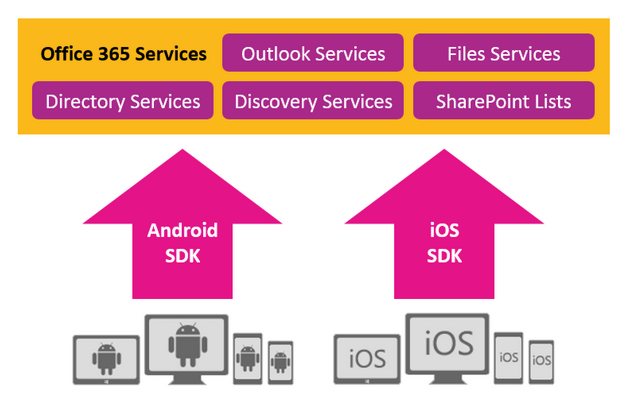| New APIs for Office 365 |
| Written by Kay Ewbank | |||
| Thursday, 30 October 2014 | |||
|
At TechEd Europe, Microsoft has announced new APIs in the hope of getting developers to create apps for Office 365. These are new REST-based APIs for mail, files, calendar and contacts that you can use to create apps for Android, iOS, Windows and the Web that extend Office 365, Microsoft’s cloud-based office software. The Office 365 APIs also offer single sign-on with Azure Active Directory (Azure AD), so an app only needs to be registered once to access any of the Office 365 API services.
The Office 365 APIs are REST services that provide access to high-value data types from Office 365 services: mail, calendars, and contacts from Exchange Online; files and folders from SharePoint Online and OneDrive for Business; and users and groups from Azure AD. The APIs follow REST and OData 2.0 standards for data transport, and use the OAuth 2.0 standard for authentications and authorization. You can host apps that use the APIs in Azure or other cloud platforms, and the support for single sign-on with Azure AD means you authenticate your users once, then let them access the email, files, calendar, or user information. Other APIs will be made available for managing tasks, Yammer and Office Graph in the future. Alongside the new APIs, Microsoft announced new mobile software development kits (SDKs) for native app development with Office 365. The SDKs join the Visual Studio SDK announced earlier in the year, with the launch of an iOS SDK, and a new version of the Android SDK. The iOS SDK currently supports Objective-C and Swift within XCode 6. The SDKs are modular, containing five independent packages: Outlook Services provides CRUD operations for mail, calendar and contacts stored in Office 365 Exchange Online; Files Services provides access to files stored in Office 365 OneDrive for Business accounts and SharePoint Online sites; Directory Services gives you access to users, groups and their properties via the Azure AD Graph API; SharePoint Lists provides access to lists and list items stored in Office 365 SharePoint Online; and Discovery Services help you determine the base URL for various services. There’s a good write-up about the new SDKs on the Microsoft Open Technology blog. The Visual Studio SDKs provide .NET and JavaScript libraries that wrap the Office 365 REST services. The SDKs are available for ASP.NET MVC, ASP.NET Web Forms, WPF, Win Forms, Universal App, Cordova and Xamarin project types in Visual Studio. The final part of the announcement introduces an Office 365 app launcher, which gives a single, customizable place in Office 365 where users can access their favorite apps. Until now, apps created for Office 365 have appeared in the Office Store or in private app catalogs. The new app launcher will let you add your apps to the main app launcher alongside the ‘standard’ Office 365 elements such as Outlook or OneDrive. On the Office Devs Blog, Microsoft says that it has been working with: “close partners, including SmartSheet, Xero.com, DocuSign, K2 and Nintex, to bring their apps to the Office 365 app launcher. ... We look forward to our customers and partners integrating their apps with the new Office 365 app launcher as it rolls out to customers over the coming months.”
The iOS preview SDK is available on GitHub, along with the production ready release of the Office 365 SDK for Android and you can find sample code and documentation at the Office Dev Center.
More InformationThe Office 365 platform —new opportunities for developers New Office 365 extensibility for Windows, iOS, Android and web developers Office 365 SDK for Android on GitHub Office 365 SDK for iOS on GitHub Related ArticlesOffice Developer Tools for Visual Studio 2012
To be informed about new articles on I Programmer, install the I Programmer Toolbar, subscribe to the RSS feed, follow us on, Twitter, Facebook, Google+ or Linkedin, or sign up for our weekly newsletter.
Comments
or email your comment to: comments@i-programmer.info |
|||
| Last Updated ( Thursday, 30 October 2014 ) |



